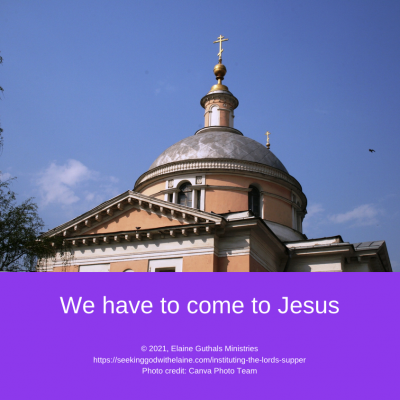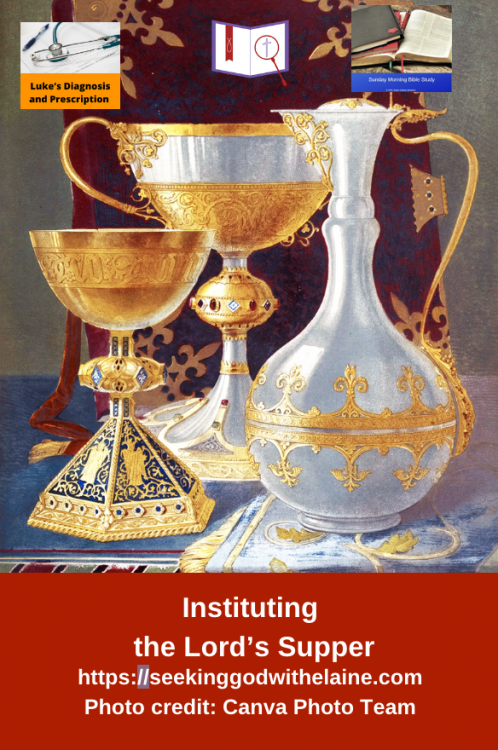Jesus was excited to get the opportunity to observe the Passover meal with His disciples. This daily devotional looks at how preparation for the Lord’s Supper mirrors preparation for salvation.
Nuggets
- We need to prepare ourselves to know Jesus as our Savior.
- We must spend time with Jesus in order to decide to believe in Him.
- We must choose Jesus and then learn more of Him.

Jesus knew He was facing His death on the cross. First, He observed the Passover meal with His friends.
At the end of the meal, Jesus instituted the Lord’s Supper. It points toward salvation. Let’s take a look.
Let's Put It into Context
We’ve talked Lord’s Supper a couple of times. We looked at it when we were doing ordinances. It was observed after the Passover meal.
To read a related devotion, click the button below.
Fun Fact
Ridgeway gave us an interesting nugget. He wrote, “It [The Lord’s Supper] was at first the only act of united worship. And it was celebrated at least every Lord’s Day.”
Resource
Preparation Is Needed
“Then the Day of Unleavened Bread came when the Passover lamb had to be sacrificed. Jesus sent Peter and John, saying, ‘Go and make preparations for us to eat the Passover.’ ‘Where do you want us to prepare it?’ they asked him. ‘Listen,’ he said to them, ‘when you’ve entered the city, a man carrying a water jug will meet you. Follow him into the house he enters. Tell the owner of the house, “The Teacher asks you, ‘Where is the guest room where I can eat the Passover with my disciples?’” Then he will show you a large, furnished room upstairs. Make the preparations there.’ So they went and found it just as he had told them, and they prepared the Passover” (Lk. 22: 7-13 CSB)
We need to prepare ourselves to know Jesus as our Savior.
Passover was a big deal to the Jews. It was a ceremony that God Himself instituted so they could remember what God had done for them.
It was an elaborate meal with several courses. Not having a house in Jerusalem, Jesus and the disciples had to borrow space in someone else’s house in order to comply with God’s requirements. Preparations had to be made.
Tyng equated the preparations for the Passover meal with the preparations we need to make to ask Jesus to be our Savior. He noted that all of the Old Testament led up to His coming. There is a time we must also use in order to prepare for accepting our Savior.
Resource
Jesus was sending the two disciples out to prepare before the time of the Passover meal was upon them. Luke left out a nugget that Matthew put in. “On the first day of Unleavened Bread, when they sacrifice the Passover lamb, his disciples asked him, ‘Where do you want us to go and prepare the Passover so that you may eat it?’” (Mk. 14: 12 CSB). Matthew 26: 17 gives the same information.
We have to come to Jesus, also. God isn’t a dictator that forces Himself on us. Just as Adam and Eve chose to disobey Him, we have to choose to obey Him.

We need to learn that our ways are sinful. Sins are actions by humans that disobey God and break one of His reasonable, holy, and righteous laws and commandments, goes against a purpose He has for us, or follows Satan’s promptings. These laws and commandments not only show us what we have done wrong, but they also show us the character of God. It is an attitude that encourages us to exercise our free will and not follow God.
Jesus was, as Dunning pointed out, very deliberate in His directions on preparing for the Passover meal. He even went so far as to what to tell the man just carrying a jug of water.
The disciples had heard at least three times that Jesus was going to die for our sins. Jesus knew, though, they didn’t understand it all. He would want to take this time during the meal to prepare them for what they faced.
Resource
The meal had to be set up in a certain way to represent that Jesus is the way of salvation.
- Salvation is the gift of life through the deliverance from evil and the consequences of sins to replace them with good and eternal life.
- The consequences of sin are spiritual death and physical separation from God.
- Spiritual death is the spiritual separation from God that occurred as a consequence of Adam and Eve’s original sin. The spiritually alive are those who have ABCDed, so they are no longer separated from God.
- Eternal life is the promise of living eternally – even if we have died in this life – because we have admitted our sins, believed Jesus as Savior and Redeemer, and confessed God as Sovereign Lord.
The ABCDs of Salvation
If you have not become a believer in Christ, please read through the
Plan of Salvation and prayerfully consider what God is asking you to do.
A – admit our sins
B – believe His Son Jesus is our Redeemer
C – confess God as Sovereign Lord
D – demonstrate that commitment by making any changes needed in our lives to
live the way in which God has called us
The Disciple’s Job Description
Glossary
I feel I need to add a disclaimer. God doesn’t expect us to become perfect and then approach Him for salvation. He saves us where we are and then works with us to become perfect in His sight.
To read a related devotion, click the button below.
The Time Comes
“When the hour came, he reclined at the table, and the apostles with him. Then he said to them, ‘I have fervently desired to eat this Passover with you before I suffer. For I tell you, I will not eat it again until it is fulfilled in the kingdom of God.’ Then he took a cup, and after giving thanks, he said, ‘Take this and share it among yourselves. For I tell you, from now on I will not drink of the fruit of the vine until the kingdom of God comes’” (Lk. 22: 14-18 CSB)
We must spend time with Jesus in order to decide to believe in Him.
I have long thought how great it was that Jesus had this last time to spend with His Disciples. John gave us an extensive account of what Jesus said that night.
But in a way, it has always amazed me that Jesus had “… fervently desired to eat this Passover with you …” (Lk. 22: 15 CSB). How could He so look forward to one of the last things before His arrest?
Beddome wrote that, “Hereby he gave an undeniable proof, that He was made under the ceremonial as well as moral law.” He wanted to show that He did not come to do away with the law but to fulfill it (Mt. 5: 17).
Resource
That was what Jesus was all about — fulfilling His mission. Ker said of the Passover that it had “… now reached its end, and found its full meaning.” That could be said, too, of Jesus’ mission.
To read a related devotion, click on the appropriate button below.
Resource
Part of the reason Jesus was really looking forward to this meal was the “… before I suffer” part (Lk. 22: 15 CSB). He knew what He was facing: agony and humiliation. He needed His friends.
I don’t mean to say Jesus needed them to keep Him from backing out. But they did bolster His courage. I am sure they had been His support circle for three years.
Ker made a great point. He wrote, “We may feel startled at the thought that the Son of God should be dependent on such aid at such a moment. And yet it is in keeping with all His history — with the whole plan of redemption. The Divine and human are inseparably interwoven in the life and work of Christ.”
Resource
But then, Jesus wanted that time together just as much for them as He did for Him. He knew they were going to need support.
Think about Peter denying Jesus three times if he hadn’t just heard all Jesus had told him.
- “‘You will never wash my feet,’ Peter said. Jesus replied, ‘If I don’t wash you, you have no part with me.’ Simon Peter said to him, ‘Lord, not only my feet, but also my hands and my head’” (Jn. 13: 8-9 CSB).
- “‘Lord,’ Simon Peter said to him, ‘where are you going?’ Jesus answered, ‘Where I am going you cannot follow me now, but you will follow later.’” (Jn. 13: 36 CSB).
- “Don’t let your heart be troubled. Believe in God; believe also in me. In my Father’s house are many rooms. If it were not so, would I have told you that I am going to prepare a place for you? If I go away and prepare a place for you, I will come again and take you to myself, so that where I am you may be also” (Jn. 14: 1-3 CSB)
- “Peace I leave with you. My peace I give to you. I do not give to you as the world gives. Don’t let your heart be troubled or fearful” (Jn. 14: 27 CSB).
The preparation of the meal was important, but the time had come to actually eat. It all comes down to us making a decision: are we going to ABCD or not?

The Actual Ceremony
“And he took bread, gave thanks, broke it, gave it to them, and said, ‘This is my body, which is given for you. Do this in remembrance of me.’ In the same way he also took the cup after supper and said, ‘This cup is the new covenant in my blood, which is poured out for you’” (Lk. 22: 19-20 CSB)
We must choose Jesus and then learn more of Him.
It is really interesting to think about the previous sacrifices and the ordinance of the Lord’s Supper. God had decreed that He wanted all these blood sacrifices. They were messy and smelly. They were probably noisy.
Not so with the Lord’s Supper. It is to be subdued and reflective.
To me, that shows us the twist that Jesus’ sacrifice brought. The ceremonial sacrifices through the years were to be outward indications of our relationship with God. It was to be binational-wide.
David and Elijah really couldn’t get close to God. Sin stood in the way.
The Lord’s Supper is all about the individual. After Jesus’ blood worked its atoning job, we can — and should — be close to God.
We have to know where we stand with God. In fact, Ridgeway called the Lord’s Supper “… the test of the reality of your Christian profession” and “… a test of our faithfulness [as] the servants of Christ.”
Resource
I belong to a denomination that takes these elements spiritually, not literally. The bread and grape juice stay just that.
I can see that. Right now, we are worshiping God spiritually. The purpose of the supper is to feed our souls.
Some day, we will get to fall at His feet and worship Him. That isn’t now.
The focus right now is on remembering. We think of His willingness to shed His blood on the cross when His body was broken.
Jesus’ focus was on establishing a new covenant. “… This cup is the new covenant in my blood, which is poured out for you’” (Lk. 22: 20 CSB).
The Weekly Pulpit said the covenant was all about forgiveness and life.
Resource

Making the Connections
Dunning reminded us that we, too have to prepare for the Lord’s Supper. He wrote, “It requires the preparation of mind and heart made by private meditation, and by the gathering together beforehand of disciples for prayer, conference, and instruction.”
Resource
What that is really telling us is that our focus has to be right. It has to be on God.
Jesus was also telling us that our lives had to be right. He did call Judas out as His betrayer. “Jesus replied, ‘He’s the one I give the piece of bread to after I have dipped it.’ When he had dipped the bread, he gave it to Judas, Simon Iscariot’s son” (Jn. 13: 26 CSB).
Ridgeway reminded us that it was Jesus’ last wish that, “… as often as [we] eat this bread and drink the cup, [we] proclaim the Lord’s death until he comes” (I Cor. 11: 26 ESV). He wanted us to remember.
Resource
How Do We Apply This?
We are to come to the Lord’s Supper table focusing on God. Ridgeway said we did that by coming
- Humbly.
- Trustingly.
- Earnestly.
- Reverently.
- Regularly.
- Frequently.
- Early.
Resource
Brooke told us how not to come to the table. We are to not come formally or begrudgingly. Instead, we are to come humbly, reverently, and faithfully.
Resource
Did you catch that? We are to come reverently but not formally. Yes, we are to approach Him as Sovereign God — but He is also Dad.
I think Hughes helps us out with that. We are to come to the table in anticipation while we are reviewing where we are in our relationship with God.
Resource
Jesus wanted us to not only remember Him, but He also wanted us to be like Him. We can take time during the ordinance of the Lord’s Supper to evaluate how we are doing with that.
Father God. We praise Your name for sending Your Son to pay the penalty for our sins. We believe He is our Savior. Help us to remember Him through the Lord’s Supper. May it be a time when we can evaluate our relationships with You so we can grow them. Amen.
What do you think?
Leave me a comment below (about this or anything else) or head over to my Facebook group for some interactive discussion.
If you don’t understand something and would like further clarification, please contact me.
If you have not signed up for the email daily or weekly providing the link to the devotions and the newsletter, do so below.
If God has used this devotion to speak with you, consider sharing it on social media.
Pingback: How Else Do We Set Our Thoughts Above? – Seeking God with Elaine